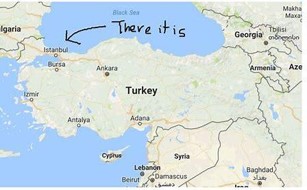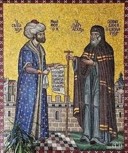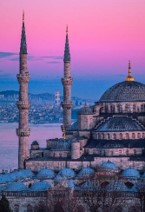Istanbul

We fly into Istanbul and spend one-day touring. Istanbul is on the other side of the country from the earthquakes that have rocked the southeastern side. Check out my blog on the earthquakes.
Istanbul is one of the world’s most visited cities, with a rich culture shaped by the various peoples that have inhabited its territory over several millennia. It seems a bit silly to write a 300-word blog about a city with a 10,000-year history. But I shall do it for those unfamiliar (including me) with this amazing metropolis.
Picture of the dome of Istanbul’s Hagai Sofia Mosque
 According to Wikipedia.org, Istanbul is the most populous city in Europe. Many may know it as Constantinople, named after the Roman emperor Constantine, who legalized Christianity and made the city his imperial capital in 330 AD/CE. Architectural masterpieces were built across the city, including the Hippodrome, the Imperial Palace, and Hagia Sophia, which remained the world’s largest cathedral for a thousand years. The church was converted to a mosque after the city fell to the Ottoman Turks in 1453. There are 234 active churches and chapels in the city. (Wikipedia.org 2018)
According to Wikipedia.org, Istanbul is the most populous city in Europe. Many may know it as Constantinople, named after the Roman emperor Constantine, who legalized Christianity and made the city his imperial capital in 330 AD/CE. Architectural masterpieces were built across the city, including the Hippodrome, the Imperial Palace, and Hagia Sophia, which remained the world’s largest cathedral for a thousand years. The church was converted to a mosque after the city fell to the Ottoman Turks in 1453. There are 234 active churches and chapels in the city. (Wikipedia.org 2018)
 The city played a key role in advancing Christianity until conquered by Sultan Mehmed II (see picture) and became an Islamic stronghold. Mehmed II invited people from all over Europe to his capital, creating a cosmopolitan society that persisted during much of the Ottoman period. The famous Suleiman the Magnificent’s reign from 1520 to 1566 was a period of educational, artistic, and architectural achievement, and the arts of ceramics, stained glass, and calligraphy flourished. (See the picture of the blue Mosque)
The city played a key role in advancing Christianity until conquered by Sultan Mehmed II (see picture) and became an Islamic stronghold. Mehmed II invited people from all over Europe to his capital, creating a cosmopolitan society that persisted during much of the Ottoman period. The famous Suleiman the Magnificent’s reign from 1520 to 1566 was a period of educational, artistic, and architectural achievement, and the arts of ceramics, stained glass, and calligraphy flourished. (See the picture of the blue Mosque)
 In 1930 the name was officially changed to Istanbul.
In 1930 the name was officially changed to Istanbul.
Revolutions, wars, and political and economic upheaval have troubled the country from the 1880s to the present.
I found this interesting: My first attempt to visit Turkey in 2017 was on a cruise ship stop that was canceled due to political unrest after a 2016 unsuccessful coup attempt. In 2017 their parliamentary republic was replaced with an executive presidential system, which limits the president to two terms. President Erdoğan’s second term ends in 2023. The presidential election is scheduled for June 2023.